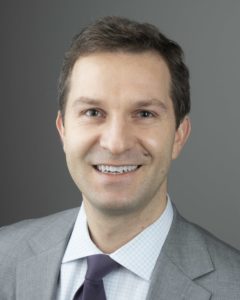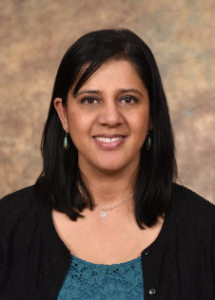Last updated on
Get to Know Our COVID-19 and Thrombosis Grant Recipients!
We now know that some patients who get COVID-19 can develop serious blood clots. To address the need for more studies on COVID-19 and thrombosis, NATF awarded two $25,000 grants to support research and career development among clinicians and scientists in the early stage of their careers. We’re thrilled to introduce the NATF community to our two awardees, Drs. Alec Schmaier and Shuchi Gulati!
MEET DR. SCHMAIER

Alec Schmaier received his medical degree and PhD at the University of Pennsylvania, where he studied platelet biology. “Platelets are the tiny blood cells that help us form clots. They can be activated in disease and cause heart attacks and strokes. I studied how they become activated on vessel wall collagen under conditions of blood flow,” he explains.
After finishing his PhD, he completed his internal medicine residency at the Hospital of the University of Pennsylvania in Philadelphia. He then came to Boston to pursue a cardiology fellowship with an additional year of clinical training in vascular medicine. He also completed a postdoctoral research fellowship at Beth Israel Deaconess Medical Center, where he’s now on staff in the Department of Cardiovascular Medicine. “I currently see patients in clinic every week and do vascular medicine consults as I try to grow my own laboratory program in basic science and translational research. I think of translational research as going from bench to bedside, meaning from the lab to the patient care setting or the reverse, from bedside to bench. Translational research exists right at that interface. It may involve measuring patient samples, looking for new biomarkers that could have value in making a diagnosis or providing treatment to a patient, or taking early therapies developed in the lab and examining how they function in a clinical trial.”
Dr. Schmaier has been researching the body’s response to inflammation for several years. “People who have severe infections get very sick, which is known as “sepsis.” They have inflammation all over their body, their blood vessels become leaky, and they’re prone to having blood clots. My colleagues and I have done research looking at patients with sepsis. Some of them had a predisposition to forming blood clots and some didn’t, and we identified some key proteins and signaling pathways that were unique in the patients who had clotting problems. We found that if we can activate these pathways, we can potentially help suppress blood clots in experimental models. The COVID-19 pandemic now gives us a natural opportunity to study some of these protein targets we’ve identified and learn more about how clotting is regulated in severe illness. We think that these signaling pathways that affect blood vessel integrity are going to be severely altered in COVID-19. That’s the first thing I’m hoping to look at with NATF’s generous grant.”
A second aim of the project is to look at a new therapy in COVID-19 trials. “We have a novel therapy unrelated to this project and we’re going to be taking patient samples and testing them on cells grown in our laboratory to see whether this drug can decrease the tendency of the endothelial (blood vessel lining) cells to form blood clots in COVID-19,” says Dr. Schmaier.
“I think that we’re going to learn a lot more about the biology of COVID-19 and what’s going on with blood vessels and clotting. I think—and hope— that our research will give us information that we can apply to other diseases and to blood clotting in general. Sometimes, the silver lining of these extreme medical situations is that they give us really important insights that we can apply broadly to other issues.”
MEET DR. GULATI

Shuchi Gulati attended medical school in India and completed her internal medicine residency in Reading, Pennsylvania. She completed her fellowship in hematology and oncology at the University of Cincinnati and recently obtained a master’s degree in clinical and translational research. She specializes in genitourinary cancers—prostate, kidney, and bladder cancers—and also oversees clinical trials at the University of Cincinnati School of Medicine.
Dr. Gulati had an interest in treating cancer since childhood. “My mother had cancer when I was very young and even though I didn’t understand what she was going through, I saw how it impacted our family as a unit. Knowing that she was sick made me want to get involved with cancer research so that I could make a difference. And now as a doctor, it really impresses me how cancer patients can go through such major setbacks and then come out the other side. It’s very inspirational.”
Since becoming an oncologist, Dr. Gulati has started to focus more on cancer and blood clots (cancer-associated thrombosis). “There’s a huge unmet need there. When patients with cancer get clots, we sometimes don’t connect those dots. There’s a lot of research that still needs to be done, especially now in the COVID era,” she explains.
When the pandemic hit, Dr. Gulati started thinking about how COVID might affect cancer patients in particular. “The University of Cincinnati got involved with this national registry called CCC-19 – the COVID and Cancer Consortium. More than 100 institutions are now part of it. I’m part of the Consortium’s thrombosis team and started collecting data for the registry. As part of that project, I became really interested in whether there’s an overlap between patients with cancer-associated blood clots and patients with COVID-19 infection and that’s why I applied for NATF’s grant.”
“Many patients with cancer may be taking medications or receiving treatments that heighten the risk of blood clots already. In the setting of COVID-19 infection, there might be a subset of those patients who need more aggressive doses of medication to prevent blood clots—what we call “thromboprophylaxis”—whether they’re in the hospital or at home,” says Dr. Gulati. “So that’s what I want to study – if patients with cancer will have worse outcomes, especially clot-related outcomes, if they already have risk factors for blood clots and then get infected with COVID-19. I also hope to learn if there’s anything specific that would help these patients, like counseling, additional drug support, or specific guidance related to COVID-19 in general.”
The response to Dr. Gulati’s work has been overwhelmingly positive. “My patients have been excited to hear about my research. I find that patients like to know when you’re working on a project or thinking about ways to make their lives better, especially when they have multiple medical issues to manage. The reception from my colleagues and patients around this project is encouraging and I hope that this collaborative effort with CCC-19 will help us provide patients with some key information about cancer, COVID-19, and blood clots.”
*Originally published in The Beat – October 2020. Read the full newsletter here.



